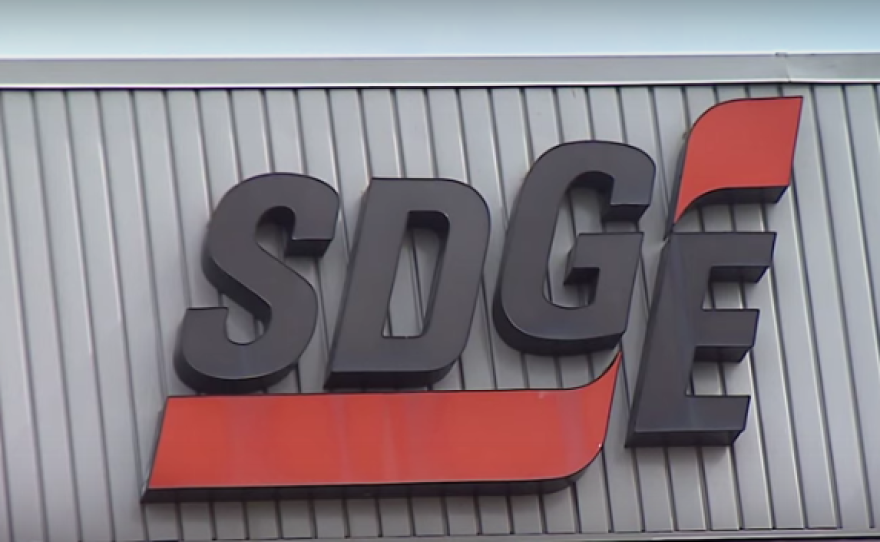San Diego Gas & Electric is prohibited by state law from marketing or lobbying against an alternative energy program called "community choice aggregation" unless it does one thing.
On Friday, it took the first step toward doing that one thing.
SDG&E sent a notice to the California Public Utilities Commission saying it plans to form an independent marketing district that would be "functionally and physically separate from the utility’s ratepayer-funded divisions," the only legal option available for it to communicate about community choice.
It's the first utility in the state to take this step.
San Diego is considering switching to community choice as a way of using only renewable energy by 2035, a goal laid out in Mayor Kevin Faulconer's Climate Action Plan.
Currently, San Diego Gas & Electric purchases energy for all the residents and businesses in San Diego. Under community choice, the city would make those purchasing decisions, giving it more control over where the energy comes from.
Related Story: San Diego Energy Study Never Finished
At a recent heated meeting of the city's Sustainable Energy Advisory Board, which advises the City Council and mayor on energy policies, an SDG&E representative asked if he could speak about community choice.
State law prevents utilities from marketing or lobbying against community choice aggregation.
At the meeting, Deputy City Attorney Fritz Ortlieb explained that the law means SDG&E employees should not vote or comment during discussion of community choice aggregation.
The board was advised that SDG&E can't market or lobby against community choice "unless it creates a separate independent marketing division that is in no way supported with ratepayer funds and which is supported entirely by SDG&E’s shareholders," Ortlieb said in a statement after the meeting.
Now SDG&E is moving to set up that independent marketing division, with an effective date of Dec. 21.
In its letter, the utility wrote that as local governments create their own climate action plans and consider community choice, the state's "extraordinary restrictions" leave "an informational vacuum for those very local governments and stakeholders who are trying so hard to pursue the right path toward a greener energy future."
"This vacuum is the product of the utility’s concern that it might be accused of advocating against CCA, as opposed to the utility simply participating in a healthy public discussion of the region’s efforts and progress toward a greener future," SDG&E said.
"Moreover, this vacuum is often filled by information from CCA proponents who seem to believe that non-utility service is the only means by which to achieve a greener and more local energy supply, so that the attendant benefits (e.g., jobs) are captured to a greater extent by the local area. SDG&E understands the goal of such local efforts but does not believe that a CCA program is the only means to such an end," the letter continued.
Nicole Capretz, executive director of the environmental nonprofit Climate Action Campaign, is one of those community choice proponents. She believes community choice is the only way for the city to reach its goal of 100 percent renewable energy and says SDG&E's move shows it will do whatever it can to oppose community choice.
"What’s most offensive is that they're couching their proposal as that they're just trying to get more information out to the public. But the reality is they’re trying to influence the public and trying to influence our elected officials to make sure they don’t move forward with allowing there to be an alternative energy source for the community," Capretz said.
"I think that’s un-American, frankly, to be saying they don’t think residents and businesses should have a choice, that we should be stuck with only SDG&E as our energy provider."
SDG&E spokeswoman Amber Albrecht wrote in a statement that the utility is working with the city to "lower greenhouse gas emissions through energy efficiency programs, alternative fueled vehicle programs, and by providing 100 percent of the customers we serve with 33 percent of the energy sourced today from renewable sources and growing to 50 percent by 2030."
She said SDG&E filed its letter "to create an independent marketing division that will join in the public dialogue on community choice aggregation" and added customers will not pay for the marketing and lobbying activities. Instead, Sempra, SDG&E’s parent company, will cover the cost.
Capretz said she plans to file a letter protesting SDG&E's action. Those protest letters must be received by the California Public Utilities Commission before Dec. 10.







